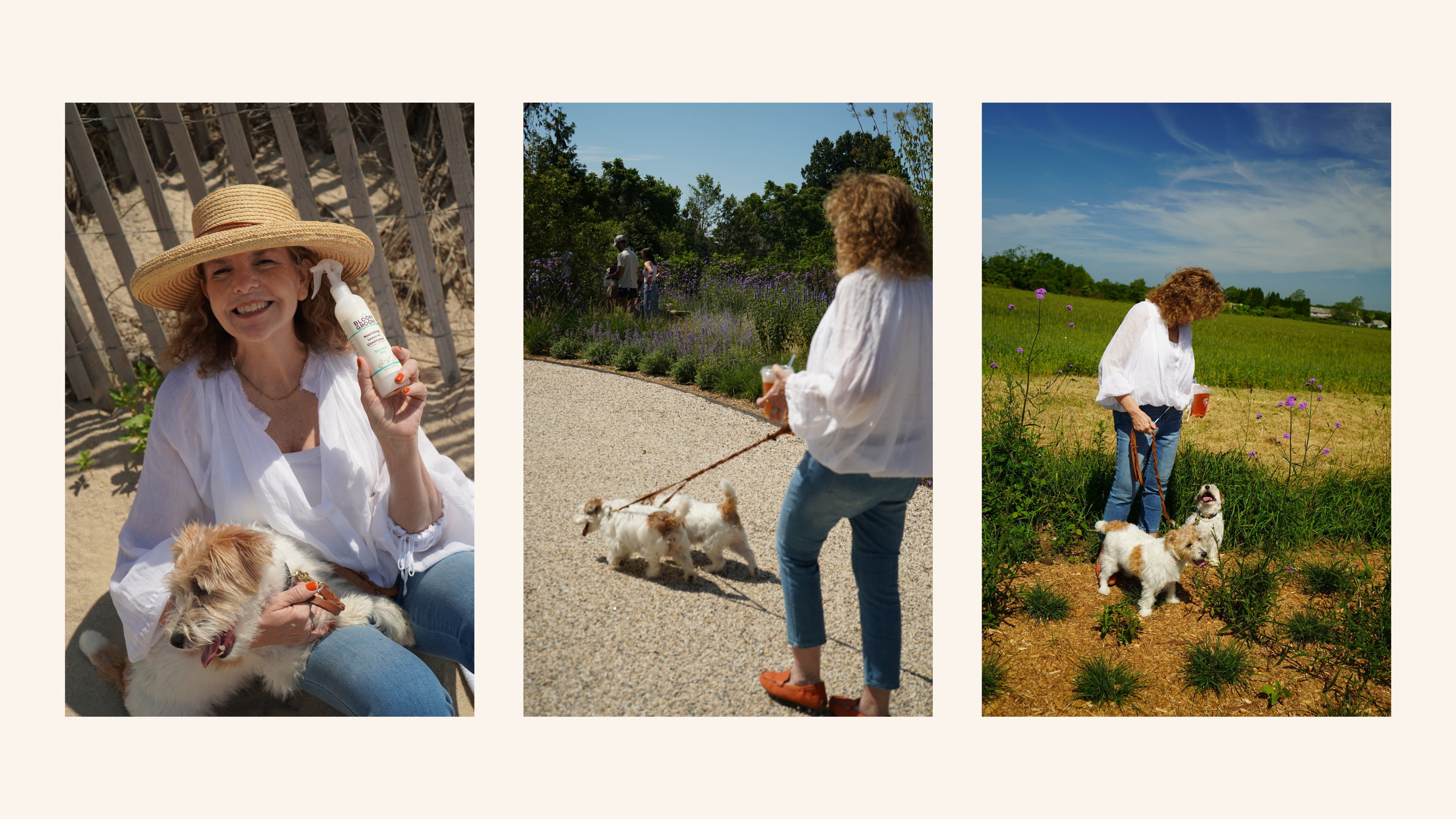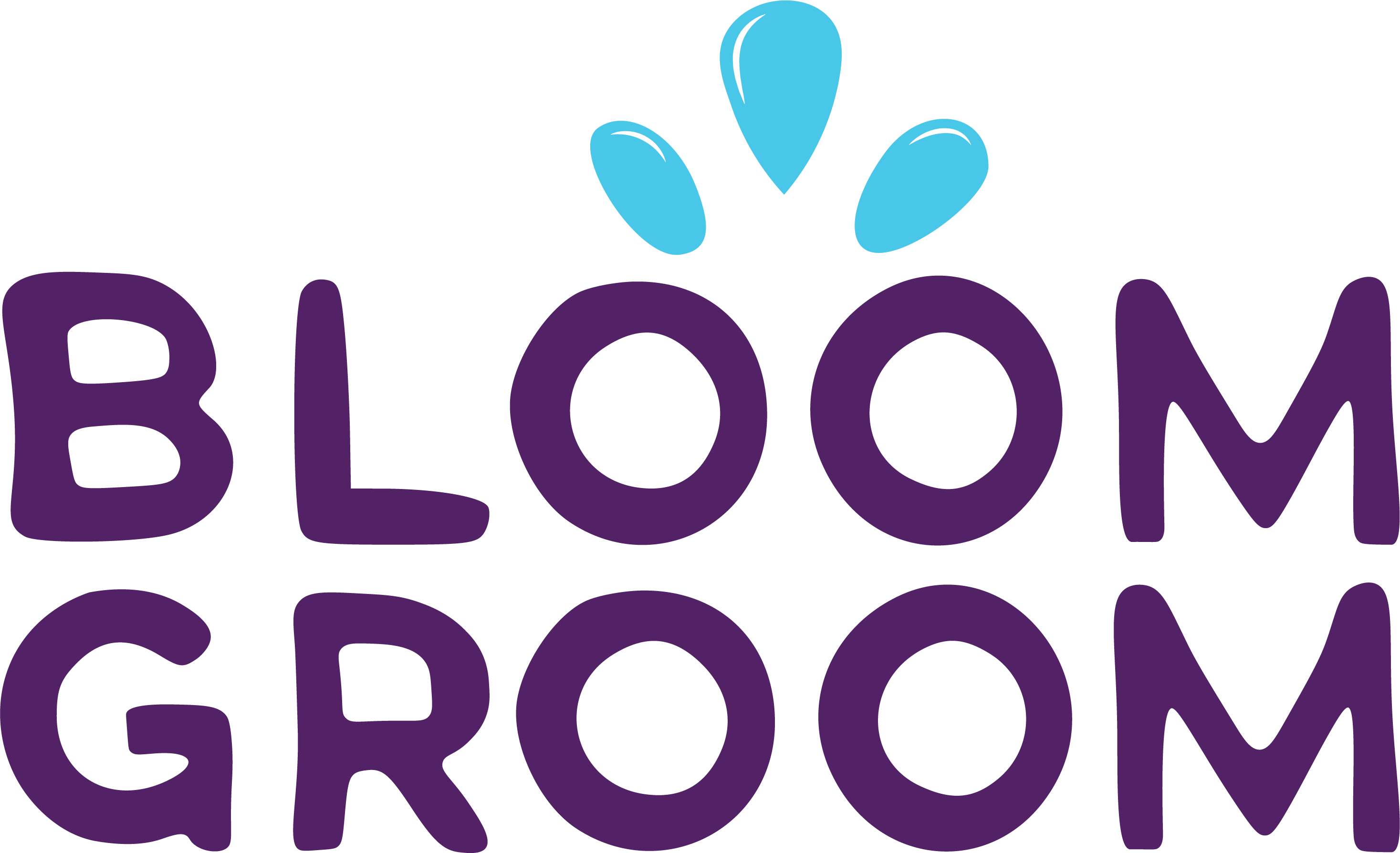
Grooming that Feels Like a Ritual
The Bloom Edit
BOTANICAL BAY

AMBER SUMMIT

Bring Intention To Bath Day
The Essential Touches
From The East End With Love


The Groomer's Journal
You've probably seen "colloidal oatmeal" on skincare labels, but what exactly is it, and why do we swear by it for dogs with sensitive skin?
The science behind colloidal oatmeal:
Colloidal oatmeal isn't just ground-up breakfast oats. It's oat kernels that have been processed into an extremely fine powder that can absorb water and form a protective barrier on skin. The "colloidal" part means the particles are so small they stay suspended in water instead of settling out.
This matters because the smaller the particles, the better they can penetrate hair follicles and reach the skin surface where they do their work.
Why oatmeal works for irritated skin:
Oats contain compounds called avenanthramides, which are natural anti-inflammatories. When your dog's skin is red, itchy, or irritated, these compounds help calm the inflammatory response that causes discomfort.
But that's just the beginning. Colloidal oatmeal also contains beta-glucans, which form a protective film on the skin surface. This film helps prevent moisture loss while allowing the skin to breathe — something synthetic ingredients often can't do.
The grooming professional's perspective:
I've used dozens of dog shampoos over the years, and nothing soothes irritated skin like a properly formulated colloidal oatmeal product. Dogs who come in scratching and uncomfortable often show visible improvement after just one bath.
What separates professional formulations from big box products is the concentration and particle size of the oatmeal. Cheap products often use regular oat flour, which is too coarse to provide the full spectrum of benefits.
How we use it in our formulation:
Our colloidal oatmeal is pharmaceutical-grade, processed to ensure consistent particle size and maximum bioavailability. We combine it with complementary ingredients like panthenol and gentle surfactants that clean without stripping natural oils.
The goal isn't just to add oatmeal to shampoo — it's to create a complete system where every ingredient supports skin health. Colloidal oatmeal is the foundation, but it works best when combined with other skincare-grade ingredients.
When colloidal oatmeal makes the biggest difference:
Dogs with environmental allergies often see dramatic improvement. Seasonal itching, hot spots, and general skin sensitivity all respond well to regular use of colloidal oatmeal products.
It's also gentle enough for daily use if needed, unlike medicated shampoos that can cause irritation with frequent application.
What to look for in colloidal oatmeal products:
The ingredient should be listed as "colloidal oatmeal" or "avena sativa kernel flour" — not just "oatmeal" or "oat extract." The finer the grind, the more effective the product.
Avoid products that combine oatmeal with harsh or mystery sulfates or artificial fragrances, which can counteract its soothing properties.
The bottom line:
Colloidal oatmeal isn't a marketing gimmick — it's a scientifically proven ingredient that provides real relief for dogs with sensitive or irritated skin. When properly formulated and combined with other skin-supporting ingredients, it can transform your dog's comfort level and skin health.
We include pharmaceutical-grade colloidal oatmeal in our shampoos because it works, not because it sounds natural. The results speak for themselves.
I've seen too many dogs come into my grooming van with irritated, flaky skin. Their skin is sensitive and a slight imbalance can disrupt the barrier. Using your own shampoo, even the good stuff seems harmless, but the chemistry tells a different story.
The pH problem you can't see:
Human skin has a pH between 4.5-6.5, while dogs run 6.5-7.5. That might seem like a small difference, but pH is logarithmic — each whole number represents a 10x change in acidity. Using human shampoo on your dog is like washing your face with dish soap.
When you disrupt your dog's natural pH balance, their skin barrier breaks down. This leads to increased water loss, bacterial overgrowth, and that tight, itchy feeling that makes dogs scratch constantly. *mind=blown*
What can happen when you use human products:
First, you'll notice increased shedding. A damaged skin barrier can't hold hair follicles properly. Then comes the itching, followed by red, inflamed patches where they've scratched. Eventually, you might see hot spots or secondary bacterial infections.
I've had clients spend hundreds at the vet treating skin conditions that probably started with a single bath using human shampoo. Healthy dogs don't get irritated skin from nowhere, after all. The vet prescribes medicated shampoos and antibiotics, but if you keep using the wrong products, the problem just comes back.
The ingredient dangers:
Sulfates in human shampoos are particularly harsh on dog skin. Sodium lauryl sulfate creates that satisfying lather we associate with "clean," but it strips away the protective oils dogs need. Fragrances designed for human preference can be overwhelming to dogs' sensitive noses and cause respiratory irritation.
Preservatives like parabens and formaldehyde-releasing agents are another concern. Dogs groom themselves, meaning they're ingesting whatever you put on their skin. Professional dog products are formulated with this in mind.
The solution is simple:
Use products specifically formulated for dogs by professionals who understand canine skin and coat chemistry. Quality dog shampoos contain gentle surfactants, pH-balancing ingredients, and skin-soothing additives like colloidal oatmeal, panthenol, and aloe vera juice.
Yes, skincare-grade dog shampoos cost more than pet store products. But consider the alternative: vet bills, prescription treatments, and a miserable dog who can't stop scratching. The extra $8-10 is very worth it.
Emergency alternatives:
If you absolutely must wash your dog and don't have proper shampoo, use a tiny amount of baby shampoo diluted heavily with water. It's not ideal, but it's gentler than adult formulations. Follow up with a quality dog shampoo and conditioner as soon as possible to restore pH balance.
The bottom line: your dog's skin is different from yours. Respect that difference with products designed specifically for them.
Shop our line of groomer-founded, skincare-grade products and discover the difference that going the extra mile makes.
Professional grooming every 6-8 weeks is ideal, but let's be honest — life happens. Your dog doesn't pause their adventures just because their appointment is next week.
After running a mobile grooming business for over 10 years, I've seen what works (and what doesn't) for maintaining that fresh-from-the-groomer look at home.
The daily maintenance routine that actually works:
Every morning, do a quick brush-through with a slicker brush or pin brush, depending on your dog's coat type. This isn't just about tangles — you're distributing natural oils and removing surface dirt before it settles in.
For paws, keep a microfiber towel by your door. A quick wipe after each walk prevents dirt from spreading through your house and building up on their pads. If your dog is particularly active, consider a professional-grade paw cleanser that contains antimicrobial ingredients.
Weekly deep-clean without the full bath:
Use a high-quality dry shampoo formulated specifically for dogs. The key word here is "formulated" — baby powder and human dry shampoos can actually damage your dog's skin barrier. Look for products with natural starches that absorb oils without disrupting pH balance.
Work the dry shampoo into their coat using your fingers, let it sit for 2-3 minutes, then brush out thoroughly. Pay special attention to areas that get oily fastest: behind the ears, around the collar line, and the base of the tail.
The spot-cleaning strategy:
For muddy paws or dirty bellies, use groomer-quality cleansing wipes. Not all wipes are created equal — avoid anything with alcohol or harsh fragrances. Professional wipes contain gentle cleansers and moisturizers that clean without stripping natural oils.
Why this approach works:
Regular maintenance prevents the buildup that makes dogs smell between grooms. When you stay on top of daily care with professional-grade products, you're supporting your dog's natural skin barrier instead of constantly disrupting it with emergency baths.
The goal isn't to replace professional grooming — it's to extend that fresh, clean feeling between appointments. Quality products make this possible without the time commitment of full baths.
You just spent 30 minutes wrestling your dog in the tub, used half a bottle of shampoo, and somehow they still smell like wet dog two hours later. Sound familiar?
After grooming thousands of dogs, I've learned that lingering odor after bathing almost always comes down to one thing: you're not addressing the root cause, just masking symptoms.
The real culprits behind persistent dog odor:
Most dog owners think soap equals clean, but that's human thinking. Dogs have a skin pH of 6.5-7.5, completely different from ours, which sits around 5.5. When you use products formulated for human skin (or cheap dog shampoos that ignore pH), you're disrupting their natural skin barrier.
A damaged skin barrier can't regulate oils properly. Too much oil production leads to that greasy, smelly buildup that no amount of scrubbing will fix. Too little oil production creates dry, flaky skin that actually traps odor-causing bacteria.
The solution isn't more soap — it's better chemistry.
Some products available for professional groomers can ignore this key principal. They load products with heavy scents that last for weeks, but the skin underneath is crying for help! When we developed our shampoo line, we focused on gentle surfactants that clean without stripping, plus ingredients like colloidal oatmeal that actually work to repair the skin barrier while cleansing.
Here's what actually works:
Start with a pre-rinse to remove loose dirt and debris. Use a enough shampoo to work up a gentle lather and massage it in for 2-3 minutes. The key is contact time — let the active ingredients do their job. Rinse thoroughly, then rinse again. Trapped soap residue is another major cause of post-bath funk. A gentle shampoo will rinse easier, but remember how thick dogs' hair is, so make sure you rinse thouroughly!
Follow up with a leave-in conditioner formulated for dogs. This isn't luxury — it's protection. A good leave-in creates a barrier that helps maintain proper moisture levels and prevents the oil imbalance that leads to odor and gunk.
The bottom line: If your dog still smells after a bath, the problem isn't your technique. It's probably your products. Quality, skincare-grade formulations cost a bit more upfront but actually save you time and frustration in the long run.







